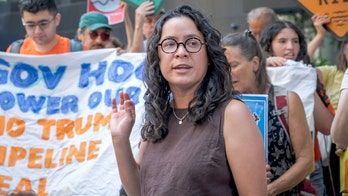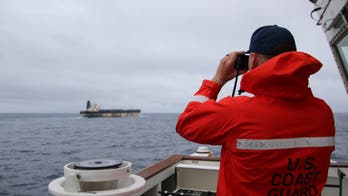Pope Francis, in the first-ever papal address to a Joint Meeting of Congress, delivered a simple but passionate plea for humanity -- urging lawmakers to protect "every human life" and calling for a united response of "hope and healing, of peace and justice" for a world racked by violence and unrest.
Speaking at the center of American power Thursday morning, the pontiff tackled urgent topics spanning immigration, family, the death penalty, climate change, extremism, religious freedom and the refugee crisis. Specifically, he joined American bishops in urging the abolition of capital punishment, and said Congress has a "role to play" in addressing global warming.
But he also issued a broader and more fundamental appeal, saying lawmakers are tasked with pursuing the "common good," and citing the "Golden Rule" as a starting point for how countries should respond to all these challenges.
"The rule points us in a clear direction," he said, after receiving loud applause and a standing ovation.
Francis cited the "Golden Rule" while discussing immigration and the refugee crisis and in making a reference to abortion, a subtle theme during the address.
"The Golden Rule also reminds us of our responsibility to protect and defend human life at every stage of its development," he said, after earlier urging policymakers to use the law to protect "the image and likeness fashioned by God on every human life." Touching on the marriage debate, Francis also said he's concerned about "the family," and said "fundamental relationships are being called into question, as is the very basis of marriage and the family."
Looking beyond social issues, though, the pope bluntly addressed religious violence and the refugee crisis that has resulted. While urging the world to safeguard religious freedom, he warned Thursday of rising "fundamentalism" of all kinds.
"Our world is facing a refugee crisis of a magnitude not seen since the Second World War," the pope said, while referencing immigration to the U.S. as well. "... We must not be taken aback by their numbers, but rather view them as persons, seeing their faces and listening to their stories, trying to respond as best we can to their situation. To respond in a way which is always humane, just and fraternal. We need to avoid a common temptation nowadays: to discard whatever proves troublesome."
After speaking in the House chamber, Francis visited the Capitol's Statuary Hall and its statue of Father Junipero Serra, the 18th-century missionary whom Francis elevated to sainthood Wednesday in the first canonization on U.S. soil. He then briefly stepped out onto a Capitol balcony to address the cheering crowds on the West Front.
"Thank you very much, and God bless America," he said in English to the crowd, and waved.
Even in a chamber accustomed to receiving foreign dignitaries, the pontiff's historic address stirred an energy and enthusiasm rarely seen at the Capitol, with huge crowds showing up outside to catch a glimpse of him and some lawmakers inside showing up early for a good spot -- despite a warning from leaders to refrain from trying to shake the pope's hand.
Several lawmakers, including House Speaker John Boehner, were visibly emotional during the pope's visit and address. Boehner also met briefly with the pope before he took the podium. The House chamber was packed with Supreme Court justices, Cabinet officials, diplomats, lawmakers and their guests.
During his address, the pope said, "Our efforts must aim at restoring hope, righting wrongs, maintaining commitments, and thus promoting the well-being of individuals and of peoples."
Francis also declared during the address that he sides with U.S. bishops calling for the abolition of the death penalty, saying he believes in "rehabilitation." The pontiff who has been outspoken on the issue of climate change also said the "environmental challenge we are undergoing and its human roots concern and affect us all." He said the U.S. and Congress "have an important role to play."
Some of his strongest remarks, toward the end of his address, concerned the arms trade. "Why are deadly weapons being sold to those who plan to inflict untold suffering?" he asked. "Sadly, the answer ... is simply for money, money that is drenched in blood." He said "it is our duty to confront the problem and to stop the arms trade."
The address was one of the pope's last engagements in Washington before leaving for New York on his three-city visit to America that also includes Philadelphia.
He spoke at the dais where the president delivers the annual State of the Union address and monarchs and heads of state have addressed Congress. Behind sat Vice President Joe Biden and Boehner, R-Ohio, the first and second in line to the presidency, both Catholics.
Ahead of Francis' remarks lawmakers of both parties busily sought political advantage from his stances, with Democrats in particular delighting in his support for action to overhaul immigration laws and combat global warming and income inequality. One House Republican back-bencher announced plans to boycott the speech over Francis' activist position on climate change, which the pontiff renewed alongside President Obama on Wednesday.
But Boehner, a former altar boy who invited Francis to speak after trying unsuccessfully to bring his two immediate predecessors, John Paul II and Benedict XVI, to the Capitol, has dismissed concerns that the politically engaged Francis would stir the controversies of the day.
"The pope transcends all of this," Boehner said.
For Congress and Boehner, the pope arrives at a moment of particular turmoil, with a partial government shutdown looming next week unless lawmakers can resolve a dispute over funding for Planned Parenthood related to the group's practice of providing fetal tissue for research. For members of Congress, his visit may prove little more than a brief respite from their partisan warfare, offering moments of unusual solemnity, uplift and pomp, but without fundamentally shifting the intractable gears of the U.S. political system.
After visiting St. Patrick's Catholic Church and the Catholic Charities of the Archdiocese of Washington, the pope will depart later Thursday for New York for more prayer services and a speech to the United Nations.
Separately, Maryland Gov. Larry Hogan, who is battling cancer, said he received a blessing from the pope Thursday. The blessing reportedly was given during the event at the Catholic Charities of Washington.
"It was an incredible honor to meet His Holiness Pope Francis today in Washington and receive his blessings on behalf of all cancer patients," Hogan wrote on Facebook. "My faith, like the faith of countless other patients like me, gives me strength to defeat this disease, and continue to be the best public steward I can be for the people of this great state."
Fox News' Chad Pergram and The Associated Press contributed to this report.
























